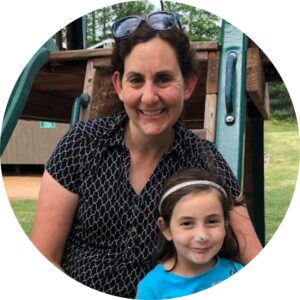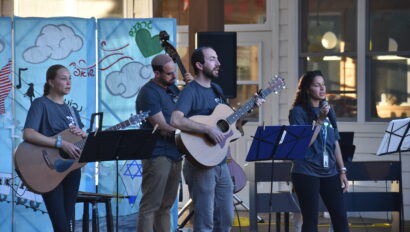Finding Meaning After the Disaster
by Moria Lehman
My daughter Ronnie was not happy when she discovered that her Bat Mitzvah parashah is Acharei Mot. You can’t blame her. This is the only Torah portion where death appears right in the title. Not too pleasant. Ronnie didn’t even get the dramatic story about the death of Aaron’s sons, Nadav and Avihu, as this story was already told about a month ago in Parashat Shemini. She only got the aftereffect: acharei mot, after the death.

It seems there’s no more appropriate year to read the name of this parashah and sense that it contains a relevant message for us, or maybe a question. It’s already been 209 days since October 7th, and we are still struggling with those feelings, those questions: How do you live after death? How do you go on at all? How do you even think about celebrating a Bat Mitzvah at this time?
For a while, the only words that came to my mind were those of the poet Nathan Zach:
עוד אפשר לחיות גם ככה
עוד אפשר בכלל לחיות
גם בלי אושר, בלי לדעת
בשביל מי ומה ואיך
It still is possible to live like this
it is still possible to live at all
even without joy, without knowing
for whom, for what, and how.
Yes, we continue to live. We realize that life will go on, that the days and the nights keep rotating, that routine is stronger than all. But what’s the point? Can you find happiness in life after the devastation? Can you find meaning?
I was able to start overcoming those feelings, inspired by Sarit Zussman, a wonderful woman and artist, who has been my children’s teacher, and lost her son, Ben Zussman z”l, in the fighting in Gaza. Ben left the family a letter, asking his family: “do not wallow in sadness.” Sarit continues this spirit in all of her doing. She spreads love of life, optimism, and the importance of happiness. She speaks about a commitment to live life to its fullest, choosing the good over the evil.
I believe our parashah also suggests a course of action to find meaning after the disaster. In the opening verse, an interesting explanation appears for the death of Aaron’s sons: “בקרבתם לפני ה’ וימותו.” They died because they were too close to God, a proximity to God that was not desired. As a result, God offers Aaron a new option to come close to God: through the mitzvot (commandments) of Yom Kippur, the one day in the Jewish year when the high priest is allowed to enter the Holy of Holies, the greatest possible proximity to God. The Torah tells us here: coming close is the way to live after the destruction.
Since October 7th I have been feeling the importance of relationships and closeness. Messages and check-ins that came from friends around the world, while getting together with the people close to me in prayer, conversation, tears or protest, were the things that helped me regain strength.
Camp Ramah for me is one of the places that allow human relationships and closeness in ways that the outside world sometimes denies. Friendships and processes happen so much faster, because of the way we are all “stuck” together, live together, share values and experiences (and give up technology while we’re at it). I am worried that camp will feel different this year, that we won’t be able to disconnect ourselves from the outside world in such a way. I wonder about how relationships will form between Israelis and Americans in camp this summer. But I also think this is the great remedy that camp can give us, being with others, in real closeness, with no barriers. I hope we will be able to be in it and accept the comfort that “Acharei Mot” suggests to us.
Moria Lehman will be returning for her 4th summer in camp as Rosh Omanuyot Habamah (Head of Performing Arts). Outside of camp, Moria is a teacher. After teaching Jewish Studies at Milwaukee Jewish Day school for 4 years, Moria returned home to Jerusalem in summer 2023. She is a teacher at “Inbar” high school in Jerusalem, teaching drama, Tanakh, and Hebrew literature.





